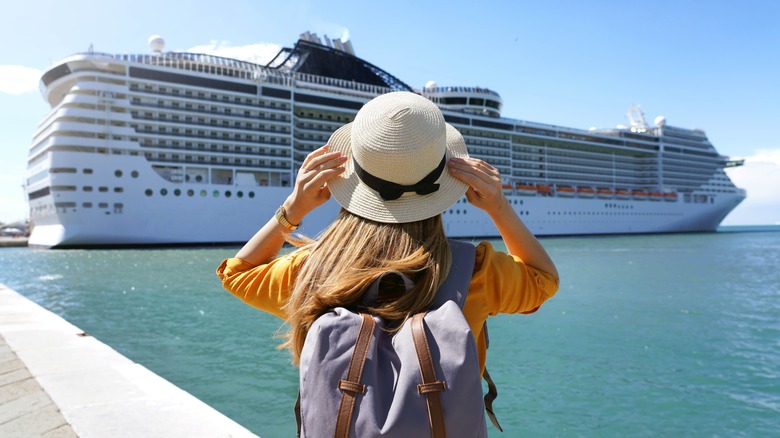Last-Minute Cruise Cancelation? Here Are Your Rights As A Passenger
There's a lot to love about cruises. As opposed to multi-destination land and air travel, where you typically have to transfer from one aircraft, train, or car to another to reach your stops, many cruises let you visit multiple destinations in a single journey. Most are also all-inclusive, allowing you to enjoy a long list of amenities and benefits on the same trip. You can access a delicious buffet daily, a cushy stateroom, live entertainment, gyms and spas, pools, and much more. The best part? You only have to pay once.
Unlike flights, cruises are also less tumultuous in terms of schedule, with cancelations coming few and far between. That is until COVID-19 happened and upended the whole industry. Even now that restrictions are much more relaxed, cancelations still occur, and if not, what happens is the opposite: cruises cram more people on board to keep up with the demand. "The issue right now is fewer people are canceling because of COVID, so they're having to readjust that algorithm a bit to account for the fact that more people are just going no matter what, " Wall Street Journal reporter Jacob Passy told CBS News.
If you plan on going on a cruise now or in the foreseeable future, you must be aware of your rights during a cancelation. Here's what you need to know.
You're entitled to a full compensation
Finding out that the cruise you've been excited about has been canceled can cause frustration. Unfortunately, it happens beyond our control, driven by factors like inclement weather, mechanical issues, and overbooking. The best course of action is to exercise your rights as a passenger and check what compensation you can get from the cruise line in exchange for your troubles.
Pre-pandemic, it was usually up to the cruise line's discretion how they would compensate passengers for canceled trips. Some do a full refund, while others offer travel credits they can use for future vacations. However, in 2022, the Federal Maritime Commission issued a new ruling to better protect consumers from financial setbacks caused by cancelations. "It's the first time that the law has been changed since 1881, since the California gold rush," FMC Commissioner Louis Sola told NBC 5. "People can be confident moving forward."
As outlined in the new rules, passengers can expect a full refund from cruise operators if their booked cruise trip has been canceled or delayed for three or more days. The refund includes the full amount they paid, including miscellaneous fees. Operators are also mandated to clearly communicate to passengers their refund policies to manage everyone's expectations.
You may also request to be rerouted somewhere else
Should you experience a cruise cancelation but don't want to give up on your trip entirely, there may still be ways to pursue your on-deck adventures. If you don't like a cash refund, you can contact the cruise operator to see if you can board a different cruise. Aside from repayments, cruise operators are expected to offer alternatives that may be more convenient to guests, such as a reservation on a different sailing. However, you may have to learn how to adapt quickly, as the alternative cruise may have other destinations. But hey, an adventure is an adventure, right?
What's more, you must also be ready to pony up more money on an alternate sailing if it's more expensive than your original trip. Since you're only entitled to the full amount you paid previously, any charges on top of that will need to be shouldered by you — unless the cruise operator decides to be generous. "It can really vary and it depends on each individual circumstance," Jared Feldman, owner of Jafeldma Travel, shared with USA Today. Perhaps the only way you'll get to offset the additional costs is if you have reliable travel insurance, so make sure you have complete coverage before booking your cruise — or any trip for that matter. Bon voyage!


